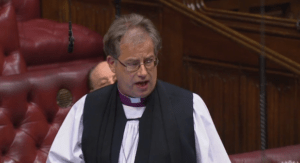The Bishop of Oxford, the Rt Revd Steven Croft, spoke in the House of Lords today on the role of education in building a flourishing and skilled society. The debate was proposed by the Lord Archbishop of Canterbury, Justin Welby.
—
“My Lords, with others I am grateful to the Archbishop of Canterbury for his leadership in this debate and so much else.
I speak this afternoon from three perspectives. As the Bishop of a diocese with over 280 church schools, primary and secondary. As a member of your Lordships Select Committee on Artificial Intelligence – which has been a fascinating enterprise. As a grandfather with three unsuspecting young grandsons who will enter the education system in the next year or so.
Those grandsons will grow up in a different world. They will probably never drive or own cars. They will interact with screens and machines from an early age. They will need to know how to set boundaries around their online lives. Their working life and their leisure will be more different from my own than mine was from my grandfathers’.
As Lord Baker and Lord Putnam have indicated, between 20 and 40% of jobs will simply no longer exist when they leave school, affecting disproportionately current areas of deprivation. The life script of education followed by work, then retirement will no longer apply, their school years will be essential in helping them prepare to live purposeful and productive lives, not confined to paid employment, in the formation of character and values in a digital world and in laying the groundwork for lifelong education and learning.
As the Archbishop and others have said, we are living through an unprecedented digital revolution which will impact everyone. It will have extraordinary implications on the range of skills that today’s young people will require in every aspect of their lives. It is essential to set an ethical digital education at the very heart of the curriculum for the future.
Knowledge and skills will not be enough. We are only beginning to glimpse the shifts required. There has been a major reboot in the teaching of computer science in schools in the last three years which is wholly welcome but clearly just a beginning. I have spoken with secondary school teachers and a university head of department locally, this is a real success story. The curriculum is more engaging and problem centred. The aspirations are higher. There are many pockets of excellence, including I am glad to say in my own diocese.
However, the recent Royal Society report on computing education in UK schools published a few weeks ago reveals that we have only just begun to set things right. Computing education across the UK, we read, is patchy and fragile. Its future development and sustainability depend on swift and coordinated action by governments, industry and non-profit organisations.
A majority of teachers are teaching an unfamiliar subject without adequate support. Teacher training and recruitment are uneven and behind their targets. I agree with Lord Baker on extending ethical computer and digital education to sixteen, and with Lord Rees on the need to retain breadth all the way through our school and university system. I can still remember having to choose between mathematics and ancient Greek many years ago.
In the recent budget, the government indicated that major investment in these areas will be forthcoming: £406 million for maths and technical education; £84 million to train 8,000 computer science teachers, trebling their number by the end of this Parliament; and a new centre for Computing Education.
The government’s new industrial strategy identifies four grand challenges of which the first is to put the UK at the forefront of the artificial intelligence and data revolution. Education and skills are vital in meeting this goal.
But this digital education must be set clearly in the context of ethics and values, and the ethics and values we are commending today must be at the heart of our digital education.
The scope of PHSE and SMSC work must include the digital challenges children and young people are facing: how to set boundaries; to preserve your identity; to recognise signs of addiction; to behave with wisdom in a digital world (as Baroness Fall has reminded us); to build human relationships alongside followers or Facebook friends, to develop the inner force to counter as Lord Giddens and Lord Cormack have said, the very dark side of the digital world.
May I ask the minister to comment as part of his summing up of the debate on the following three questions.
- What plans does the government have for the teaching of ethics as part of the computer science curriculum in an integrated way?
- What plans does the government have for the integration of digital questions into the broader character and values education offered in our schools, and finally
- Has the government given consideration to a cabinet-level post of a minister for digital development to offer leadership across the government in such a critical sector such is the scale of the change required?
—
- Watch Bishop Steven speaking in the debate (link to follow)
- Follow Bishop Steven on Facebook
Notes:
- Read the Royal Society Report After the Reboot – Computing Education in UK Schools
- The speakers’ list for today’s debate can be found at http://www.lordswhips.org.uk/speakers-lists/04122017
- Archbishop Justin Welby is president of the Children’s Society

Speaking in the House of Lords 08/12/17



